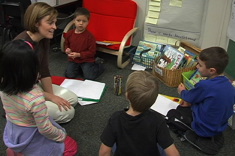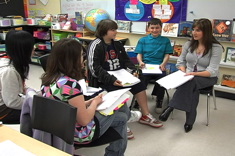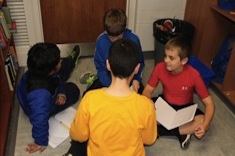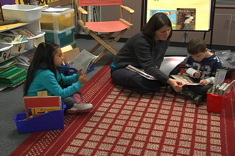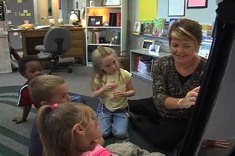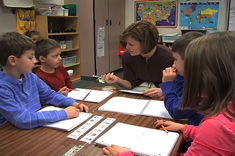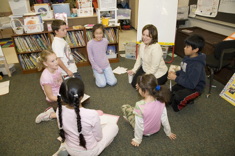It was a rainy Friday morning and time to clean up and share after what I thought felt like a productive writing workshop. My students slowly began to tuck away their writing in their folders and place the crayons and markers back in the bins. I heard a little voice call out, "Mrs. DiCesare, Shannon is crying." I quickly made my way over to Shannon to see why she was upset. Shannon loves to write, share stories, and draw. This little writer, who had been gaining confidence and taking risks, was for some reason distraught. Another student explained as I made my way over to her that she didn't want to clean up. I wondered why. She hadn't had any problems with clean up this year. Did someone hurt her feelings? Was she not feeling well?
When I saw the beautiful book she was creating, it hit me like a ton of bricks. She hadn't had enough time today to work on her writing because I pulled her over to try small-group work. I knew why she was upset, and it was my rash decision that had caused her disappointment.
After three weeks of school, I had met with my all of my writers individually, talking with them about their writing in progress and beginning to set goals. On this rainy and slow moving Friday, I figured I would pull a small group of writers (who I noticed needed practice with spacing) for guided writing. Shannon was one of these students. Looking back, I know I made two big mistakes. First, I pulled a small group for guided writing during writing workshop (something I had never done before). Usually I meet to guide writers with convention work separate from the flow of workshop. Second, I jumped into small groups too early in the year. Knowing this, I still had to help little Shannon through her tears and frustration.
"What is wrong?" I asked.
"I didn't get to finish my book today."
"I know. I am sorry." I said. "I met with you and some other friends and you worked so hard, but it gave you less time to do what you had plans for didn't it?"
"Uh-huh."
"I am thinking from now on if I need to meet with you in a small group, I will check in first thing in the morning so it doesn't take away from your own writing time. Sound good?"
"Yes." (smile)
"Let's clean up and hear what Kelly and Michael have to share."
I asked her if she needed a hug, and she seemed to pep up after a quick embrace. She then carefully organized the stories in her folder.
Taking Time When Time is Precious
After thinking about this situation, I felt awful . . . but also thankful. I am thankful that I was able to step back and realize what happened. Debbie Miller's words rang in my ears, "Give yourself permission to take the time to get it right, even if that means starting groups 4-5 weeks later than others." I know I had rushed Shannon into meeting when really what she needed was time to create, make decisions, and develop more confidence about her writing. I have to keep reminding myself that the beginning of the year is so crucial for students to have time to be writers. I had helped Shannon begin to establish a sense of agency and identity as a writer, and pulling her too soon and at the wrong time for small group work broke that spirit.
I can't help but think about the other three students in that small group. I remember how they were affected. Each one handled the situation differently. One student was confused and a bit angry that I had asked him to come over with us. Of course he was. I had helped established as a time to draw, create and write. Suddenly this time was explained as, "Here is what you have to do, and I am more worried about how your words are spaced than the story you're telling." Looking back, he also had been unable to understand the purpose for meeting together even after a quick explanation about spacing. He was still beginning to record sounds in words, and this minilesson wasn't meeting his needs. On top of that, he was also pulled 30 minutes later to work individually with support from the reading teacher. I know what you're thinking. I hadn't considered his needs and schedule at all when I put him in this group.
Another student understood the purpose, and was easily able to participate and discuss his thinking when in the small group. I think he already had an understanding of how spacing works, and felt successful knowing what to do. He happily went back to creating a book of flags with some other boys.
The final student needed quite a bit of prompting to pay attention and follow directions. When nudged to respond and participate, he was fine. But I question whether he really knew what was going on. It seemed like he was going through the motions. An individual conference may have been better for him.
This reflection creates a number of questions in my mind about how I choose students for writing groups, especially so early in the year. I know in the future I will be considering factors like:
- What do I know about the writer?
- What kind of stamina does he or she have?
- When am I pulling kids?
- Are they socially ready for small group work?
- Is this something I can address in an individual conference?
- Will the student be pulled from the flow of workshop to meet with a support teacher?
- What is my purpose for small groups, and do all the kids I am meeting with really need them?
I know I will have more questions and considerations that will develop throughout the year when thinking about small-group work. I will remember Shannon's tears as I weigh my options when conferring with kids. Small group work is beneficial for guiding learners, but I am constantly learning that I need to think about kids first.

